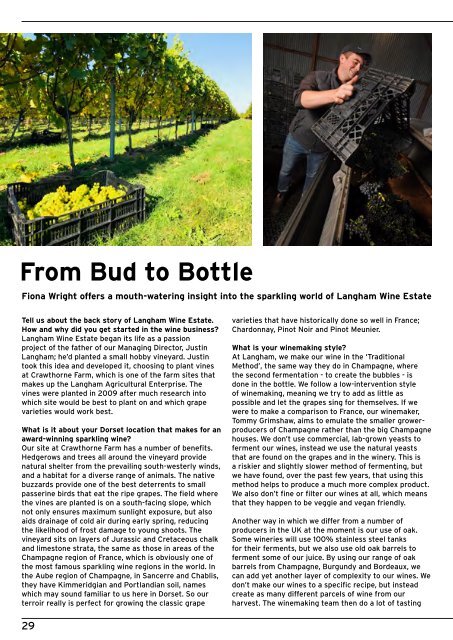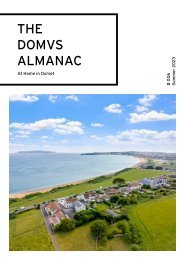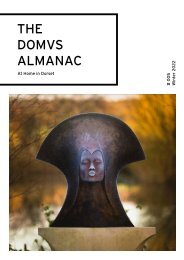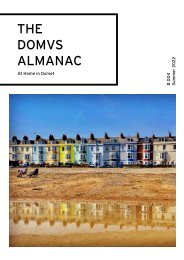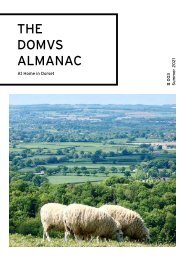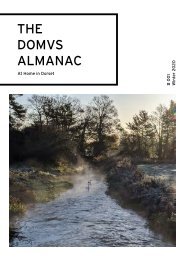The DOMVS Almanac_issue #2_Spring 2021
THE DOMVS ALMANAC At Home in Dorset
THE DOMVS ALMANAC
At Home in Dorset
You also want an ePaper? Increase the reach of your titles
YUMPU automatically turns print PDFs into web optimized ePapers that Google loves.
From Bud to Bottle<br />
Fiona Wright offers a mouth-watering insight into the sparkling world of Langham Wine Estate<br />
Tell us about the back story of Langham Wine Estate.<br />
How and why did you get started in the wine business?<br />
Langham Wine Estate began its life as a passion<br />
project of the father of our Managing Director, Justin<br />
Langham; he’d planted a small hobby vineyard. Justin<br />
took this idea and developed it, choosing to plant vines<br />
at Crawthorne Farm, which is one of the farm sites that<br />
makes up the Langham Agricultural Enterprise. <strong>The</strong><br />
vines were planted in 2009 after much research into<br />
which site would be best to plant on and which grape<br />
varieties would work best.<br />
What is it about your Dorset location that makes for an<br />
award-winning sparkling wine?<br />
Our site at Crawthorne Farm has a number of benefits.<br />
Hedgerows and trees all around the vineyard provide<br />
natural shelter from the prevailing south-westerly winds,<br />
and a habitat for a diverse range of animals. <strong>The</strong> native<br />
buzzards provide one of the best deterrents to small<br />
passerine birds that eat the ripe grapes. <strong>The</strong> field where<br />
the vines are planted is on a south-facing slope, which<br />
not only ensures maximum sunlight exposure, but also<br />
aids drainage of cold air during early spring, reducing<br />
the likelihood of frost damage to young shoots. <strong>The</strong><br />
vineyard sits on layers of Jurassic and Cretaceous chalk<br />
and limestone strata, the same as those in areas of the<br />
Champagne region of France, which is obviously one of<br />
the most famous sparkling wine regions in the world. In<br />
the Aube region of Champagne, in Sancerre and Chablis,<br />
they have Kimmeridgian and Portlandian soil, names<br />
which may sound familiar to us here in Dorset. So our<br />
terroir really is perfect for growing the classic grape<br />
varieties that have historically done so well in France;<br />
Chardonnay, Pinot Noir and Pinot Meunier.<br />
What is your winemaking style?<br />
At Langham, we make our wine in the ‘Traditional<br />
Method’, the same way they do in Champagne, where<br />
the second fermentation - to create the bubbles - is<br />
done in the bottle. We follow a low-intervention style<br />
of winemaking, meaning we try to add as little as<br />
possible and let the grapes sing for themselves. If we<br />
were to make a comparison to France, our winemaker,<br />
Tommy Grimshaw, aims to emulate the smaller growerproducers<br />
of Champagne rather than the big Champagne<br />
houses. We don’t use commercial, lab-grown yeasts to<br />
ferment our wines, instead we use the natural yeasts<br />
that are found on the grapes and in the winery. This is<br />
a riskier and slightly slower method of fermenting, but<br />
we have found, over the past few years, that using this<br />
method helps to produce a much more complex product.<br />
We also don’t fine or filter our wines at all, which means<br />
that they happen to be veggie and vegan friendly.<br />
Another way in which we differ from a number of<br />
producers in the UK at the moment is our use of oak.<br />
Some wineries will use 100% stainless steel tanks<br />
for their ferments, but we also use old oak barrels to<br />
ferment some of our juice. By using our range of oak<br />
barrels from Champagne, Burgundy and Bordeaux, we<br />
can add yet another layer of complexity to our wines. We<br />
don’t make our wines to a specific recipe, but instead<br />
create as many different parcels of wine from our<br />
harvest. <strong>The</strong> winemaking team then do a lot of tasting<br />
from each individual barrel and tank, and then decide<br />
what proportion of each will go into making our five<br />
different sparkling wines. <strong>The</strong> juice that is fermented<br />
in stainless steel will bring fresh, crisp fruit flavours,<br />
whilst the oak-fermented juice will take on some subtle<br />
characteristics from the barrels, plus it will be exposed<br />
to a bit of oxygen, which will soften the flavours. This<br />
works particularly well here in England where we have a<br />
cool climate and are producing fruit that has quite a high<br />
acidity. Another way we soften and round out the acidity<br />
is by putting all of our wines through a process called<br />
malolactic fermentation, which converts tart tasting<br />
malic acids into softer lactic acid. All of these processes<br />
go towards making the best quality, most complex,<br />
honest products we can from our site.<br />
Do you have a favourite wine from the Langham range?<br />
My personal favourite at the moment (it changes<br />
dependent on the day/mood/season!) is the latest<br />
incarnation of our Culver Classic Cuvée, which has<br />
just been released. Our two classic cuvées, Culver and<br />
Corallian, are both a blend of the three grapes we grow,<br />
but each has different proportions. <strong>The</strong> Corallian is<br />
Chardonnay dominant, with just a touch of the two black<br />
grapes in the blend; whilst the Culver is Pinot Noir and<br />
Pinot Meunier dominant with just a bit of Chardonnay<br />
in the blend. This latest incarnation of the Culver has<br />
such an exciting, expressive flavour. On the nose, you<br />
get delicious floral notes, along with hints of buttery<br />
croissants and raspberry jam. It’s an amazing example of<br />
the complexity that our winemaking and vineyard teams<br />
can achieve through all their hard work. I am a big fan of<br />
pizza and deli boards, and this wine goes really well<br />
with those kinds of foods, whilst our Corallian would be<br />
perfect with some fresh Dorset seafood.<br />
What is the most rewarding thing about your job?<br />
I would say, for me personally, seeing all the hard work<br />
and dedication that goes into each bottle and being<br />
able to share that story with consumers. We are such<br />
a small team here at Langham and everyone pitches<br />
in and helps out. It’s amazing to see the journey of<br />
our products from the tiny buds which appear in April<br />
through to harvesting the grapes in October, then<br />
bottling the wine for its second fermentation the<br />
following summer. It’s a long process full of nail-biting<br />
moments to create a bottle of exceptional sparkling<br />
wine, and it’s a joy to be able to share that process and<br />
passion with our customers.<br />
Are you open for tours and tastings?<br />
We reopened for tours and tastings on Wednesday 14th<br />
April and are so happy to be back. Our on-site café has<br />
reopened for lunches and picnics as well, so you can<br />
enjoy a full day out when you come to Langham.<br />
How/where can people buy your wine?<br />
Our wine is available to purchase direct from our<br />
website at langhamwine.co.uk and we deliver anywhere<br />
in the UK. We also sell our wine in a number of amazing<br />
local farm shops and independent wine stores. You can<br />
follow our wines’ incredible journey from bud to bottle<br />
on Facebook at facebook.com/langhamwinery and on<br />
Instagram at @langhamwinery<br />
29 30


